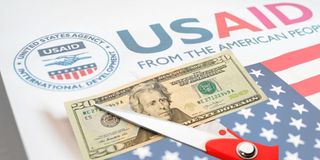Africa’s healthcare funding crisis: The world won’t save us. We must save ourselves

President Donald Trump recently suspended the operations of the United States Agency for International Development.
What you need to know:
- The recent termination of thousands of USAID programmes and grants has dramatically reduced funding for critical health programmes targeting malaria, tuberculosis, and HIV across the continent.
Africa is facing a multifaceted crisis, with interconnected challenges such as weak healthcare systems, rising unemployment rate and climate change threatening its development, stability, and the well-being of its people.
The continent’s healthcare systems are experiencing severe shocks as traditional funding sources evaporate. The recent termination of thousands of USAID programmes and grants has dramatically reduced funding for critical health programmes targeting malaria, tuberculosis, and HIV across the continent. European governments are similarly slashing foreign aid to low- and middle-income countries. In Kenya alone, over 54,000 health workers have lost their jobs due to halted projects, decimating the front lines of care delivery.
This new aid landscape underscores a bitter truth: our over-dependence on foreign assistance and unsustainable debt levels have left us fragile. Almost two-thirds of African nations now spend more on debt repayment than on health. Every year, Africa loses US$89 billion through illicit financial flows, funds that could have gone into building hospitals, training nurses, or ensuring every child receives quality education. But these are not mere economic challenges, they reflect a governance crisis. Corruption, inefficiency, and lack of accountability have hampered progress.
Our governance failures weaken institutions and disempower citizens, making it hard to demand the reforms that could secure our future.
But all is not lost. There is a growing movement toward self-determination, localised innovations, and rejection of externally imposed interventions.
In response to the challenges facing the continent, Resilience Action Network Africa, AIDS Healthcare Foundation Kenya and Pandemic Action Network recently convened a landmark meeting in Nairobi titled "Charting a Pathway for Sustainable Financing of Africa's Resilience" 29. This gathering of civil society organisations, climate campaigners, development partners and community leaders produced a radical vision for breaking Africa's aid dependency cycle.
The message from the meeting was clear: Africa cannot continue to depend on foreign donors who can suddenly change their mind and cut funding. Instead, African countries and communities must develop localised and sustainable, financing mechanisms to address healthcare, development, and climate protection.
While health is a key focus as it is one of the most visible challenges in African societies today, the Nairobi convening observed that health is not an isolated area of failure in Africa’s development models but rather a symptom of cross sectoral systemic failures as health is structurally and socially determined. Health outcomes are not just biomedical issues; they are deeply embedded in and symptomatic of broader structural and systemic inequalities, reflective of our weakened resilience capacities.
The message from ‘Charting a Pathway for Sustainable Financing of Africa’s Resilience’ meeting was that communities are no longer willing to accept being passive recipients of aid dictated by distant donors. Instead, we are calling for genuine participation in decisions that directly impact lives. We demand that solutions to our challenges must be local and community voices must be at the heart of health financing and development planning. Whether through grassroots networks, women’s groups, or local leaders, communities are demanding that their agency be recognised so that funds and policies reflect specific community needs, realities, and aspirations.
Abuja target
African nations must harness local resources — through innovative financing models like health insurance, progressive taxation, and public-private partnerships — rather than waiting for international donors, who are retreating. Communities are urging their governments to meet commitments like the Abuja Declaration’s target of allocating at least 15 per cent of national budgets to health. More importantly, they demand transparency, accountability, and local leadership in managing these funds.
Beyond health, communities have made it clear that Africa’s resilience relies on addressing the root causes that undermine resilience and prosperity — climate and environmental degradation, poverty, inequality, lack of access to education, and inadequate infrastructure.
Civil society actors and community groups are not just asking for more resources; we want to be active participants in decision making. Community-led accountability is critical — grassroots organisations must be empowered with the necessary tools to monitor, evaluate, and influence how funds are allocated and used. By doing so, communities can ensure that health services meet their needs, and that development efforts are sustainable and rooted in local ownership.
The future of Africa’s resilience depends on building systems that are locally owned, context-appropriate, and sustainable. This requires political will, bold reforms, and a commitment to place communities at the centre of the development agenda — not as passive beneficiaries but as active agents of change.
While owning the responsibility to keep governments accountable, community-based organisations convening at the Nairobi meeting urged devolvement partners to recognise their influence in shaping policy and resist approaches that inadvertently fragment civil society groups and disempower local institutions, arguing that true impact lies not in temporary gains but in supporting governments to take full ownership of equitable, accessible, and accountable public services.
The challenge now is not merely to mobilise resources but to transform the very structures that determine access, power, and accountability. Communities across Kenya and Africa are ready to lead this charge — demanding a future where their voices shape development, their needs guide policy, and their resilience is truly self-made. It’s time for those in power to listen, act, and share the stewardship of Africa’s true potential.
Mr Aluso is executive director at Resilience Action Network Africa and Africa director and global policy lead at Pandemic Action Network


